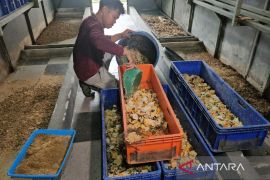"Wolbachia-containing mosquitoes do not transmit the dengue virus to humans," a researcher from EDP, Prof. Utarini said here Wednesday.
Wolbachia are bacteria that only live inside insect cells. However, they are not usually found in the Aedes aegypti mosquito, the primary species responsible for transmitting human viruses such as dengue, chikungunya, and zika.
Mosquito eggs will hatch and become adult mosquitoes, then they will mate with local mosquitoes and generate mosquitoes that contains Wolbachia, she explained.
In a certain period of time most Aedes aegypti mosquitoes in Yogyakarta will contain Wolbachia, which will ensure that the mosquitoes do not transmit the dengue virus to humans, Utarini added.
Breeding Wolbachia-containing mosquitoes is an effort to reduce the number of dengue cases, according to her.
Moreover, dengue has been a serious issue in Indonesia since 1960.
Breeding mosquitoes with Wolbachia is a safe, efficient, sustainable and environmentally friendly method in eradicating dengue, Utarini remarked.
"If mosquitoes in a certain area have contained Wolbachia, then the method is no longer reapplied," she said, and added that Wolbachia-containing mosquitoes will naturally breed in Aedes aegypti populations.
Yogyakarta has been chosen for the research as it has a high number of dengue cases, has a dense population, and Aedes aegypti are found throughout the year in all sub districts, Utarini said.
Wolbachia is a new promising technology to suppress the replication of dengue, chikungunya and zika viruses in Aedes aegypti, the World Health Organization (WHO) stated March 2016.(*)
Editor: Heru Purwanto
Copyright © ANTARA 2016











